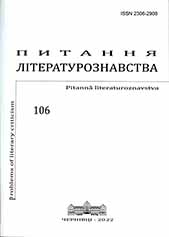Зарубіжна / світова література: проблема номінативного визначення
Foreign / World Literature: The Problem of Nominative Definition
Author(s): Kateryna KalynychSubject(s): Language and Literature Studies, Studies of Literature, Comparative Study of Literature, Theory of Literature
Published by: Чернівецький національний університет імені Юрія Федьковича
Keywords: foreign literature; world literature; universal literature; Weltliteratur;
Summary/Abstract: The terminological load of the phrase “foreign / world literature” is outlined. The attention is focused on the semantic, cultural-historical, epistemological features of this concept. Literature as a verbal art, being formed since the time of oral folk creativity, reflects the corresponding established canon in the national expression, accordingly, the dynamics of the world literary process. It is emphasized that the development of national literatures had strengthened the nature of explicit-implicit literary relationships. It contributed to the formation of new genres, artistic tastes, as well as to the expansion of the recipient`s worldview, and, accordingly, literary concepts. Controversial interpretations of Goethe’s term “Weltliteratur” are considered: supporters who perceived literature as one general world synthesis (F. Moretti) and scientists who predicted the collapse of the views of the German classics (E. Auerbach). The scientific discourse of the 20th century is assumed. Diverse interpretations of the “world literature” paradigm is understood as a collection of all works from antiquity to modern times; an anthology of the best literary texts (a kind of canonization); as a high-quality cultural and intellectual mutual enrichment. The significant contribution to the formation of the “world / foreign literature” paradigm of comparative studies and sociocultural research is emphasized (the works of P. Sorokin, O. Biletsky, L. Gumilyov, G. Gachev, D. Dyuryshin, A. Volkov of the Chernivtsi TPI School). Outlining the term world / foreign literature in the general literary process, the modern concepts of Western literary critics (E. Auerbach, P. Casanova, K. Prado and T. Samuayo, F. Moretti, D. Damrosch, R. Thomsen, J. David, N. Esenlilioglu, S. Uhliga and C. Zhang) are assumed. It is concluded that the diversity of the interpretation of the term “world / universal / foreign” literature directly depends on the historical, cultural and epistemological approaches to considering this issue; however, for all researchers there are common criteria for the nominative definition of the given paradigm – comprehensiveness, canons of a certain method, anthropological value, and participation in globalization processes.
Journal: Питання літературознавства
- Issue Year: 2022
- Issue No: 106
- Page Range: 165-181
- Page Count: 17
- Language: Ukrainian

